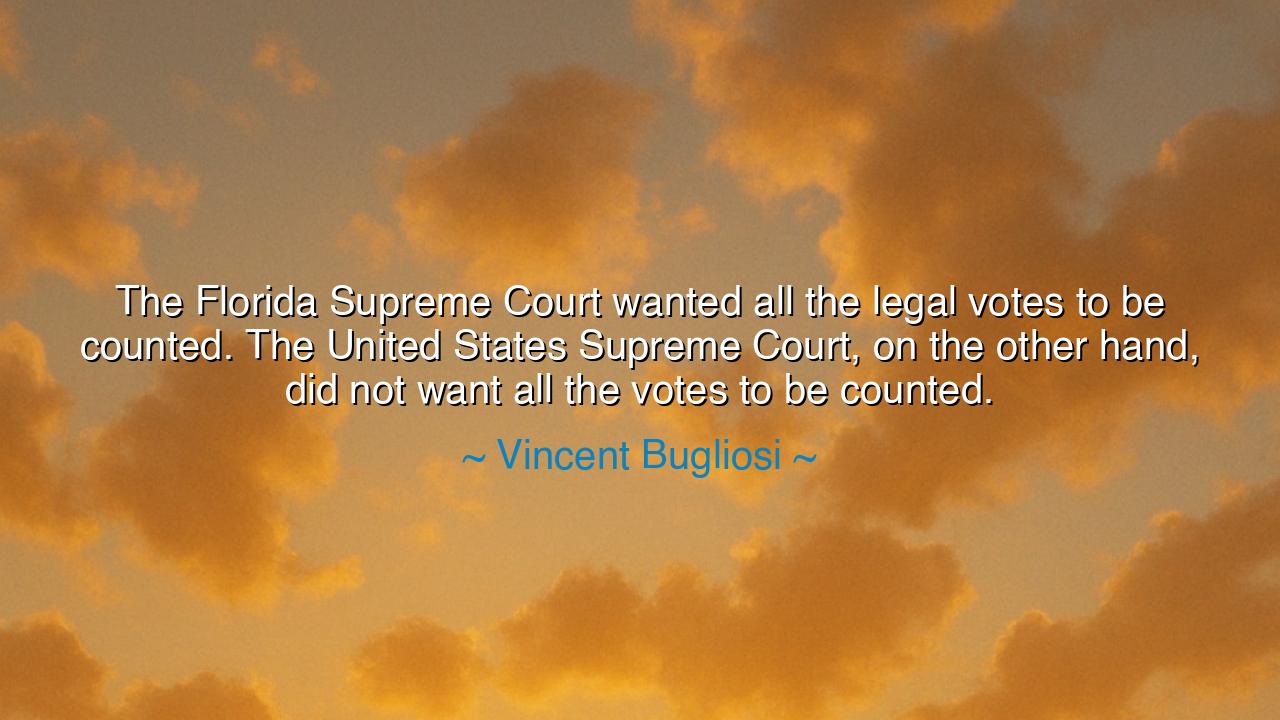
The Florida Supreme Court wanted all the legal votes to be
The Florida Supreme Court wanted all the legal votes to be counted. The United States Supreme Court, on the other hand, did not want all the votes to be counted.






When Vincent Bugliosi declared, “The Florida Supreme Court wanted all the legal votes to be counted. The United States Supreme Court, on the other hand, did not want all the votes to be counted,” he was not merely speaking of a moment in politics, but of the eternal struggle between justice and power, truth and convenience, democracy and control. His words rise like a lament and a warning — that even in the most civilized of nations, the guardians of law may forget their sacred duty: to serve the people, not to master them. Within this quote lies a profound meditation on the fragility of democracy, and the peril that comes when law ceases to be a sword of fairness and becomes a shield for ambition.
The origin of these words lies in one of the most contentious chapters of modern American history — the presidential election of 2000. The nation stood divided, its fate balanced upon the uncertain votes of Florida. Confusion reigned; ballots were disputed; and the will of the people hung like mist over a battlefield. The Florida Supreme Court, striving to preserve the integrity of democracy, ordered that every legal vote be counted. But the United States Supreme Court, by halting that recount, placed final authority above popular will. Thus, the judgment of a few outweighed the voice of millions. Bugliosi’s statement was not merely political outrage; it was moral grief — a cry from the soul of justice itself, mourning the day when law served power more than truth.
In the ancient world, philosophers warned that when the law becomes the servant of the powerful, the pillars of civilization begin to crumble. Aristotle wrote that the difference between a democracy and a tyranny is that in the former, the law is sovereign, but in the latter, men are. Bugliosi saw this ancient danger reborn — when the interpreters of law, meant to stand above faction, became its instrument. His words remind us that the sanctity of voting is not just a political right, but a spiritual covenant between the governed and those who govern. To deny its full measure is to wound the very heart of a nation’s soul.
One might recall the tale of Julius Caesar’s crossing of the Rubicon, when law was bent to ambition. Rome, once proud in its republican virtue, fell not by the sword alone, but by the slow corrosion of legal compromise. Each decision that placed expedience above principle led her closer to empire and away from liberty. Likewise, Bugliosi’s warning resounds: that justice delayed or denied, even once, opens the door to tyranny. When a single vote is silenced, the voice of the people becomes weaker, and the walls of freedom tremble.
Bugliosi himself was no stranger to law’s shadow. As a prosecutor, he wielded the power of justice with fierce precision, yet he never forgot that law without conscience is a beast that devours its own. In the wake of the 2000 election, he spoke as a man betrayed — not by the result, but by the process. His lament was not partisan; it was human. For when those entrusted with upholding justice abandon fairness, even victory tastes of ashes. His words were the echo of an older creed: that truth must not be sacrificed on the altar of power, and that no law — however lofty — can justify the silencing of the people’s voice.
There is a deeper wisdom in his statement: that legality and morality are not always one. A thing may be lawful, yet unjust. History teaches this through countless examples — laws that upheld slavery, laws that silenced dissent, laws that defended conquest. The true judge of a nation is not how it writes its laws, but how it applies them when its destiny hangs in the balance. Bugliosi’s quote reminds us that justice is not a machine of technicalities; it is a living flame, kindled by the courage to do what is right even when it is inconvenient.
Let this quote serve as a beacon to those who walk the halls of power or cast their votes in faith. Democracy lives only as long as every vote is sacred. To count them all is not a favor to the people — it is the very essence of the republic. The powerful must remember that their authority is borrowed, not owned; their judgments are not decrees of gods, but trusts of mortal men.
And so, the lesson stands eternal: never let law become the mask of injustice, nor let silence replace truth. Guard the voice of the people as the ancients guarded the sacred fire, for once extinguished, it is not easily rekindled. As Bugliosi’s words remind us, freedom is not lost in a single moment — it fades when those sworn to defend it choose the comfort of power over the courage of principle. Let the future remember this: justice dies not by violence, but by indifference, and democracy survives only when its people insist that every legal vote must be counted.






AAdministratorAdministrator
Welcome, honored guests. Please leave a comment, we will respond soon